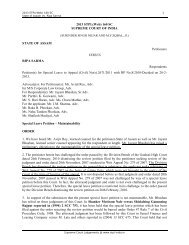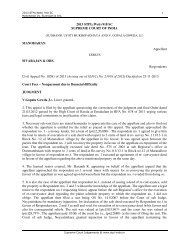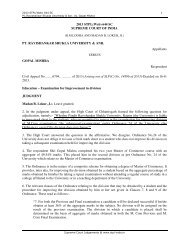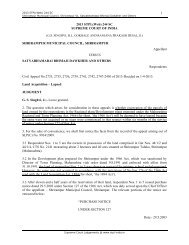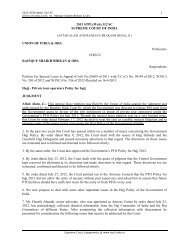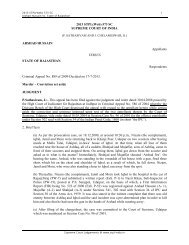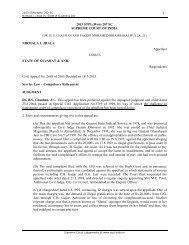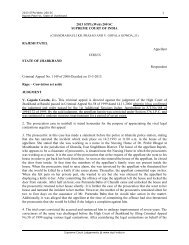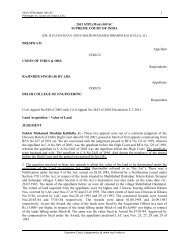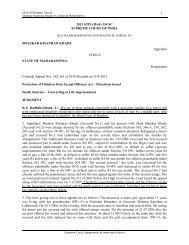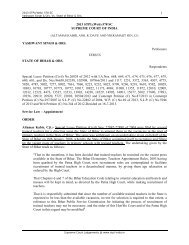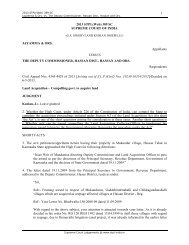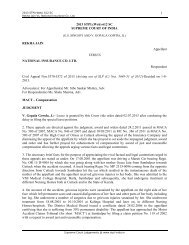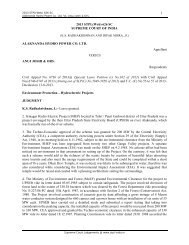2013 STPL(Web) 381 SC-FB-Sukhdev Singh Vs. Union of India and ...
2013 STPL(Web) 381 SC-FB-Sukhdev Singh Vs. Union of India and ...
2013 STPL(Web) 381 SC-FB-Sukhdev Singh Vs. Union of India and ...
You also want an ePaper? Increase the reach of your titles
YUMPU automatically turns print PDFs into web optimized ePapers that Google loves.
<strong>2013</strong> <strong>STPL</strong>(<strong>Web</strong>) <strong>381</strong> <strong>SC</strong> 3<strong>Sukhdev</strong> <strong>Singh</strong> <strong>Vs</strong>. <strong>Union</strong> <strong>of</strong> <strong>India</strong> <strong>and</strong> Others<strong>India</strong> [(1978)1 <strong>SC</strong>C 248]; <strong>Union</strong> <strong>of</strong> <strong>India</strong> vs. Tulsi Ram Patel [(1985)3 <strong>SC</strong>C 398]; Canara Bank vs.V.K. Awasthy [(2005)6 <strong>SC</strong>C 321] <strong>and</strong> State <strong>of</strong> Maharashtra vs. Public Concern for GovernanceTrust[(2007)3 <strong>SC</strong>C 587] concluded that every entry in the ACR <strong>of</strong> a public service must becommunicated to him within a reasonable period whether it is poor, fair, average, good or very goodentry. This is what this Court in paragraphs 17 & 18 <strong>of</strong> the report in Dev Dutt [(2008)8 <strong>SC</strong>C 725] at page733:“In our opinion, every entry in the A.C.R. <strong>of</strong> a public servant must be communicated to himwithin a reasonable period, whether it is a poor, fair, average, good or very good entry. This isbecause non-communication <strong>of</strong> such an entry may adversely affect the employee in two ways :(1) Had the entry been communicated to him he would know about the assessment <strong>of</strong> his work<strong>and</strong> conduct by his superiors, which would enable him to improve his work in future (2) Hewould have an opportunity <strong>of</strong> making a representation against the entry if he feels it is unjustified,<strong>and</strong> pray for its upgradation. Hence non-communication <strong>of</strong> an entry is arbitrary, <strong>and</strong> it has beenheld by the Constitution Bench decision <strong>of</strong> this Court in Maneka G<strong>and</strong>hi vs. <strong>Union</strong> <strong>of</strong> <strong>India</strong>(supra) that arbitrariness violates Article 14 <strong>of</strong> the Constitution.Thus it is not only when there is a benchmark but in all cases that an entry (whether it is poor,fair, average, good or very good) must be communicated to a public servant, otherwise there isviolation <strong>of</strong> the principle <strong>of</strong> fairness, which is the soul <strong>of</strong> natural justice. Even an outst<strong>and</strong>ingentry should be communicated since that would boost the morale <strong>of</strong> the employee <strong>and</strong> make himwork harder.”4. Then in paragraph 22 at page 734 <strong>of</strong> the report, this Court made the following weighty observations:“It may be mentioned that communication <strong>of</strong> entries <strong>and</strong> giving opportunity to represent againstthem is particularly important on higher posts which are in a pyramidical structure where <strong>of</strong>tenthe principle <strong>of</strong> elimination is followed in selection for promotion, <strong>and</strong> even a single entry c<strong>and</strong>estroy the career <strong>of</strong> an <strong>of</strong>ficer which has otherwise been outst<strong>and</strong>ing throughout. This <strong>of</strong>tenresults in grave injustice <strong>and</strong> heart-burning, <strong>and</strong> may shatter the morale <strong>of</strong> many good <strong>of</strong>ficerswho are superseded due to this arbitrariness, while <strong>of</strong>ficers <strong>of</strong> inferior merit may be promoted.”5. In paragraphs 37 & 41 <strong>of</strong> the report, this Court then observed as follows:“We further hold that when the entry is communicated to him the public servant should have aright to make a representation against the entry to the concerned authority, <strong>and</strong> the concernedauthority must decide the representation in a fair manner <strong>and</strong> within a reasonable period. We alsohold that the representation must be decided by an authority higher than the one who gave theentry, otherwise the likelihood is that the representation will be summarily rejected withoutadequate consideration as it would be an appeal from Caesar to Caesar. All this would beconducive to fairness <strong>and</strong> transparency in public administration, <strong>and</strong> would result in fairness topublic servants. The State must be a model employer, <strong>and</strong> must act fairly towards its employees.Only then would good governance be possible.In our opinion, non-communication <strong>of</strong> entries in the Annual Confidential Report <strong>of</strong> a publicservant, whether he is in civil, judicial, police or any other service (other than the military),certainly has civil consequences because it may affect his chances for promotion or get otherbenefits (as already discussed above). Hence, such non-communication would be arbitrary, <strong>and</strong> assuch violative <strong>of</strong> Article 14 <strong>of</strong> the Constitution.”Supreme Court Judgements @ www.stpl-india.in



